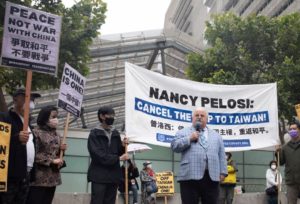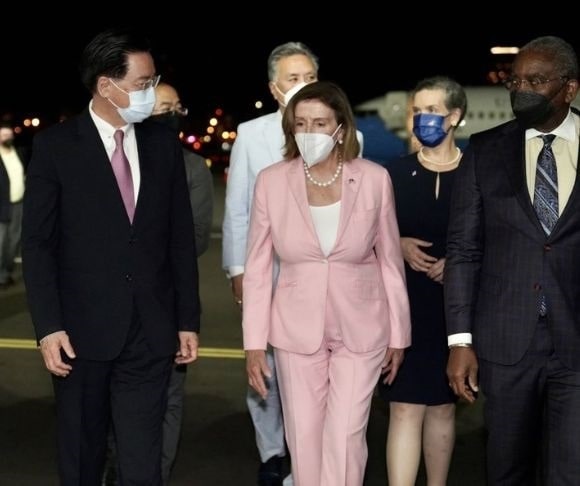The importance of Speaker of the House Nancy Pelosi’s Taiwan visit cannot be overstated. Her meetings with the Taipei government send a message to Beijing that the United States will not be cowed by the People’s Republic of China’s (PRC) hostile threats. For the last few weeks, the Chinese Communist Party (CCP) official state media and China’s leadership have warned the Biden administration of severe repercussions if the speaker landed at Songshan Airport.
President Joe Biden’s phone call with China’s President Xi Jinping on July 28 concluded with hostile warnings by the PRC’s leadership: “Those who play with fire will perish by it. It is hoped that the US will be clear-eyed about this.” Despite the overheated rhetoric, China realizes the United States is a formidable force, not to be taken lightly. “We need to keep in mind that Beijing does not want a military conflict to break out with the US. Therefore, it will likely refrain from a response that could lead to an unintended military escalation,” Amanda Hsiao, China analyst at the International Crisis Group, told a prominent Washington, DC, newspaper.
Pelosi’s Taiwan Visit Established US Resolve
That does not mean, however, that if the CCP senses weakness or irresoluteness on the part of the Biden administration, the PRC won’t take advantage and invade Taiwan. Xi has maintained firmly for at least a decade that the island is part of China and has routinely threatened to force it into subservience. “We cannot provide any incentives to this man to think that we are weak, and we will not be going to come to the assistance of Taiwan,” General Jack Keane told Fox News. Furthermore, should the United States appear timid, prompting an invasion, allies and friends in the Pacific would doubt the US resolve to honor mutual defense agreements.
On that point, Pelosi made clear in a statement that her purpose was “reaffirming our support for our partner and on promoting our shared interests, including advancing a free and open Indo-Pacific region.” She also emphasized that “America’s solidarity with the 23 million people of Taiwan is more important today than ever.” Despite Biden saying the US military did not approve of Pelosi’s visit, the US Navy demonstrated its continuing operational capability in the South China Sea, deploying an aircraft carrier, the USS Ronald Reagan (CVN-76), and a big-deck amphibious ship, the USS Tripoli (LHA-7), in the region. The Tripoli carries fifth-generation Marine F-35B Lightning II Joint Strike Fighters accompanied by several escort ships, according to the US Naval Institute News. Reporting from the Pentagon asserts that the US warships are carrying out “typical” operations.
China responded to the news of Pelosi’s arrival by announcing a series of live fire exercises to take place Aug. 4-7 just outside Taiwan’s territorial limits, The South China Morning Post reported, a “typical” response by the Chinese. Nonetheless, having the Tripoli in the area with F-35B stealth aircraft on board is a potent deterrent to the People’s Liberation Army.

(Photo by Liu Guanguan/China News Service via Getty Images)
US Has Economic Reasons to Support Taiwan
But the visit represents more than just standing up to the CCP. The United States has legitimate Indo-Pacific regional security interests that are furthered through bilateral meetings with Taipei’s leadership. According to the US trade representative, Taiwan is America’s ninth largest trading partner with $90.6 billion in total goods transactions. The supply chain of microelectronics and semiconductors from Taiwan used in practically every domestic appliance is critical to US automakers and other high-tech industries. Keeping the region safe from a Beijing takeover is a crucial national security issue. Any hostile actions by the CCP toward the Taipei government could jeopardize major US economic sectors.
As long as the Chinese believe Taiwan is a legitimate part of Mainland China and the Taiwanese believe their island is independent and sovereign, an invasion is always on simmer. Therefore, it is a geostrategic priority for America to assist Taiwan in maintaining its military defense and preserving a strong trade relationship.
The views expressed are those of the author and not of any other affiliation.




